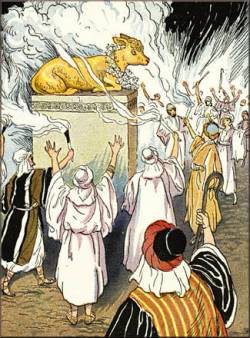
Part Three: The Will of God
First Commandment
 The wording of the First Commandment is exactly the same in
Exodus and in Deuteronomy.
The wording of the First Commandment is exactly the same in
Exodus and in Deuteronomy.
I am Yahweh, your God, who brought you out of the land of Egypt, out of the house of slavery. You shall have no gods except me (Exodus 20:1-3; Deuteronomy 5:6-7). There follow after this statement of the First Commandment, several verses of prohibition against carved images. The Latin Rite of the Catholic Church considers these verses an explanation of the first precept. You shall not make yourself a carved image or any likeness of anything in heaven or on earth beneath or in the waters under the earth; you shall not bow down to them or serve them. For I, Yahweh, your God, am a jealous God and I punish the father’s faults in the sons, the grandsons and the great-grandsons of those who hate me; but I show kindness to thousands of those who love me and keep my commandments (Exodus 20:4-6). Centuries of Catholic commentary find two levels of meaning in the First Commandment: the expressed and the implied, and on both levels there is a positive declaration or command, and a negative prohibition.
Yahweh a Jealous GodGod identifies Himself as Yahweh, which is also rendered as “Lord” or “Adonai.” In the pre-Christian Greek translation, the title was understood to mean “He who is” and the Latin Vulgate explains it to mean “I am who am.” By implication, therefore, Yahweh is the Being who simply is. He never came into existence because He always was. By further implication, He is the One who brings all other beings into existence because He is their Creator. The word “jealous,” when applied to God, means that He wants to be recognized for who He is, and does not want any creature to be given the honors which are due to the Creator. That is why God forbids anyone or anything to be worshipped as though it were divine. The Bible makes constant reference to the gods of the Gentiles. And pre-Christian history shows how widespread was polytheism or the worship of many gods and goddesses. The basic issue was not so much a question of numbers, but rather that there is only one God. The focus of the First Commandment is that there is only one Necessary Being, who cannot not exist. Everything else in the universe exists only because He brought it and keeps it in existence. The worship of any creature by paying it divine homage is a lie. There are no other gods. There is only one God. He demands to be recognized for who He is: the One Being from whom all other beings receive their existence, and by whom they are constantly sustained. It is only logical that He will punish those who refuse to honor Him as their God, and shows kindness to those who love Him by keeping His commandments. The prohibition of carved images should be seen against this background. What is really forbidden is not carved images as such. It is the worship of creatures, which can be represented in images, instead of worshipping the invisible God, who cannot be depicted in pictures or carved in wood or stone.
Adoration, Prayer and SacrificeUnderlying the First Commandment is the duty to practice the virtue of religion. This is the moral virtue which disposes us to give God the worship He deserves. He is our Creator and Lord; therefore, we owe Him submission. He is our Destiny; therefore, we owe Him our love. Adoration. Only God deserves to be adored, because only God is the First Cause of the universe from whom everything came and on whose almighty power everything depends. As our Creator, we owe Him the adoration of obedience to His laws. But God is also to be adored because He is the One for whom we were made. He wants to give us Himself, finally, in eternal happiness in heaven. We should, therefore, adore Him also with our selfless love, desiring to be united with Him, even as He wants to be united with us. If the adoration of obedience means total submission to the almighty will of God, the adoration of love means total generosity in giving ourselves beyond the demands of justice, to the One who loves us with an everlasting love. The principal way that we adore God is by prayer and sacrifice. Prayer. The voluntary response to the awareness of God’s presence is prayer. When we pray, we are doing what God mainly wants us to do in life: He wants us to communicate with Him. When we pray we are doing several things:
Our prayerful conversation with God may take on any one of several forms. We may adore God by telling Him we recognize that He is Lord and we are the creatures of His hands. We may adore God by telling Him we love Him with our whole heart. We may thank God for all the blessings He has bestowed on us and on others. We may beg for His mercy for the sins we and others have committed against Him. And we may ask Him for the graces that we and others need to reach the heavenly beatitude for which we were made. Implied in every form of prayer is the adoration of obedience and love. Sacrifice. The highest form of prayer is sacrifice. This is the willing surrender of something precious to God. As with adoration, there are two basic forms of sacrifice. There is the sacrifice of submission. Here we give up some creature that we like in order to express our total dependence on God’s will. There is also the sacrifice of love. Here we surrender something pleasant in order to please the God whom we love. Sacrifice presumes there are precious things in life: our bodily strength and life, material possessions and acceptance by others, emotional health and physical comfort, friends and the company of congenial persons. All of these, in different ways, God either will or may take away. And we are as pleasing to Him as we are willing to give them up, according to His mysterious will. The soul of sacrifice is internal surrender. We not only let go of some creature that God is removing – or wants us to remove – but we let go with our hearts. We surrender our free wills freely to the will of God. Why? Because then we show that we really love Him, not only in words which are easy, but in action, which is hard. And the hardest action we can perform is to let go of our self-will. The most perfect sacrifice we can offer is the Sacrifice of the Mass, in which we join our self-surrender with that of Christ, who offers Himself and us to the heavenly Father. Moreover, since we believe that God became man, we are to adore Jesus Christ, who is true God. We are to pray to Him as our God. We are to sacrifice ourselves for Him, because He is God, and like Him, because He became man to show us how the human will should surrender itself to the God of love.
Sins of Irreligion
For this reason, we can say that sins against the First Commandment are beyond counting. Every sin is an offense against God, who has a right to our obedience and a claim to our love. Consequently, every sin, at root, is an offense against the First Commandment. However, there are certain sins that the history of Christian morality has come to associate as more directly against the First Commandment. They are idolatry and superstition, tempting God, sacrilege, and simony. A general name for these is irreligion which is contrary to the primary virtue prescribed by the First Commandment, namely, the virtue of religion. Idolatry. The word “idolatry” means the worship of idols. It is the sin of giving divine honors to a creature. In the early Church, the followers of Christ were put to death for refusing to worship idols, even externally. Modern secularism is idolatry in practice. Money and pleasure, sex and power, science and the media can all be idolized. The key to protecting oneself from practical idolatry is always to use creatures according to the will of God. They are to be means of reaching Him and never an end in themselves. Satanism is a form of idolatry. Widely practiced under various names among polytheists who worship evil deities, it has become prevalent in western countries. Modern Satanism believes in two creator gods, one good and the other evil. Satanists venerate what Christians call Lucifer. Superstition. Although various practices are called superstitions, strictly speaking superstition is unseemly or unbecoming worship of God. This unbecoming worship may be the result of false devotion or of a tendency to magic. As false devotion, superstition has one feature in common. A person is concerned that unless certain external practices are performed, like multiplication of prayers, God will be displeased. When superstition tends toward magic, it associates God’s blessings with the veneration of unapproved objects or belief in unverified revelations or the performance of unauthorized ritual. Tempting God. This is the sin of doing or omitting something in order to test one of God’s attributes, especially His love, wisdom, or power. An explicit tempting of God is done when a person deliberately puts God to the test. Such would be telling God to work a miracle as a person throws himself over a cliff; or an atheist boasting that if there is a God, “let Him strike me dead.” These are grave crimes. But implicit tempting of God is more common. Thus it is tempting God to expect Him to provide the grace we need to fulfill our duties in life without prayer. Sacrilege. Violation of a sacred person, place, or object is sacrilege. Also called desecration, it is a grave sin that has been many times condemned in the Bible, especially in the Second Book of Maccabees and the letters of St. Paul. Implied in the sin of sacrilege is the divine precept of treating whatever belongs to God as something holy. Desecration is, therefore, an insult to God. St. Paul condemns sacrilegious reception of Holy Communion (I Corinthians 11:27-29). Simony. Named after Simon Magus (Acts 8:18) who tried to buy spiritual powers from St. Peter, simony is the sacrilege of buying or selling what is spiritual in return for money. It is forbidden by the divine law. Thus to promise prayers in exchange for money is simony. To give or obtain ecclesiastical authority in exchange for some material grant is simony. The Church recognizes the right to receive an offering for some spiritual service, as a personal gift to the one who performs the service. Mass stipends are permissible, but carefully regulated by Church law.  Copyright © 2002 Inter Mirifica
Pocket Catholic Catechism |
 There is a correct sense in which the First Commandment
contains the nine other commandments that follow. Anyone who is sincerely
trying to live out the First Commandment is living out the whole Decalogue.
There is a correct sense in which the First Commandment
contains the nine other commandments that follow. Anyone who is sincerely
trying to live out the First Commandment is living out the whole Decalogue.